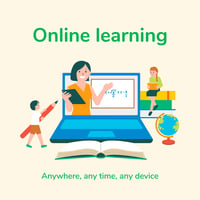Traditional classroom learning has its benefits and limitations, but most significant impact the...
Myths About Online Education
Myth, a synonym of misconception, a false belief held by people on any subject, has not spared online learning. The skepticism about online education learning originated from its early days when the lack of technology kept people from collaborating. However, with exponential growth in the social media, communication tools, breakneck internet speed, has led to in-fact a new phenomenon where learning aided by the advent in technology is either at-par or yet better than the traditional classroom learning.
We will, however, discuss the top 3 myths that people have talked about most often.
-
Blog Contents
Online education is more relaxed than in traditional classroom studies.
A deep-held belief about online education is that online learning is more comfortable to handle than conventional learning. A few students pursue online courses in the conviction that they will most likely cruise through coursework. However, as any individual who has ever gotten a take-home test knows, educators frequently make up for the accessibility of assets by expanding desires. Online classes request just as much time and consideration as in-class exercises. They often incorporate progressively composed correspondence with instructors and schoolmates, only as extra tests or written coursework to quantify advance. Students who under-gauge the remaining task at hand hazard falling behind (Bawa, 2016).
-
Online education does not engage well.
This is in-fact quite the contrast. With the availability of ingenious phones, computers, fast internet, development of collaboration platforms in which students collaborate without any boundaries that typically exist in a classroom. In a recent survey by Students tried out online instruction projects connect with friends from everywhere throughout the country. Learning on the web doesn’t need to disengage. However, the presence of tools does not make anyone use the tool. The need to engage, need to collaborate must come from within. And that is where people might occasionally get challenged. In-fact an article by MIT in 1999, supports the theory that the advent of the internet and technology has broken all barriers that did exist before the internet age. Now students are no longer bounded by their geographical presence.
Understudies should make the most out of their courses by systems administration with their companions. Not exclusively would you be able to make companions, yet you can likewise create fantastic references and associate with individuals who can later enable you to discover a vocation in your respective field. The facts demonstrate that numerous understudies have observed online courses to be more secluding than homerooms. In any case, this is frequently the aftereffect of the course structure, instead of a characteristic imperfection in “online education” training (Maldonado, Pérez-Sanagustín, & Kizilcec, 2017).
-
Online learning is less effective compared to traditional classroom study.
Online training offers adaptability for understudies who have different responsibilities. Regardless of whether you’re a bustling stay-at-home parent or an expert that doesn’t have the opportunity to take a course during school hours, you can locate an online program that works around your timetable. Offbeat alternatives permit students a chance to learn without a set week after week plan or online gatherings at a particular time (Burwell, Wessel, & T, 2015).
Conventional school programs commonly offer or even necessitate that understudies meet with consultants to enable them to design their way in school. If you need a course or two, this isn’t an issue. Nonetheless, on the off chance that you are seeking after a full degree on the web, you should be proactive in finding the data you have to guarantee that you are taking the correct classes for your degree plan. Straying from this way could establish an inability to gain scholastic ground, and you may experience difficulty verifying monetary guide (V, 2016).
References
V, C. (2016). Review and discussion: E-learning for academia and industry. International Journal of Information Management 36(3), 476-485.
.png?width=100&height=100&name=Kapdec%20Logo%20(400px).png)


